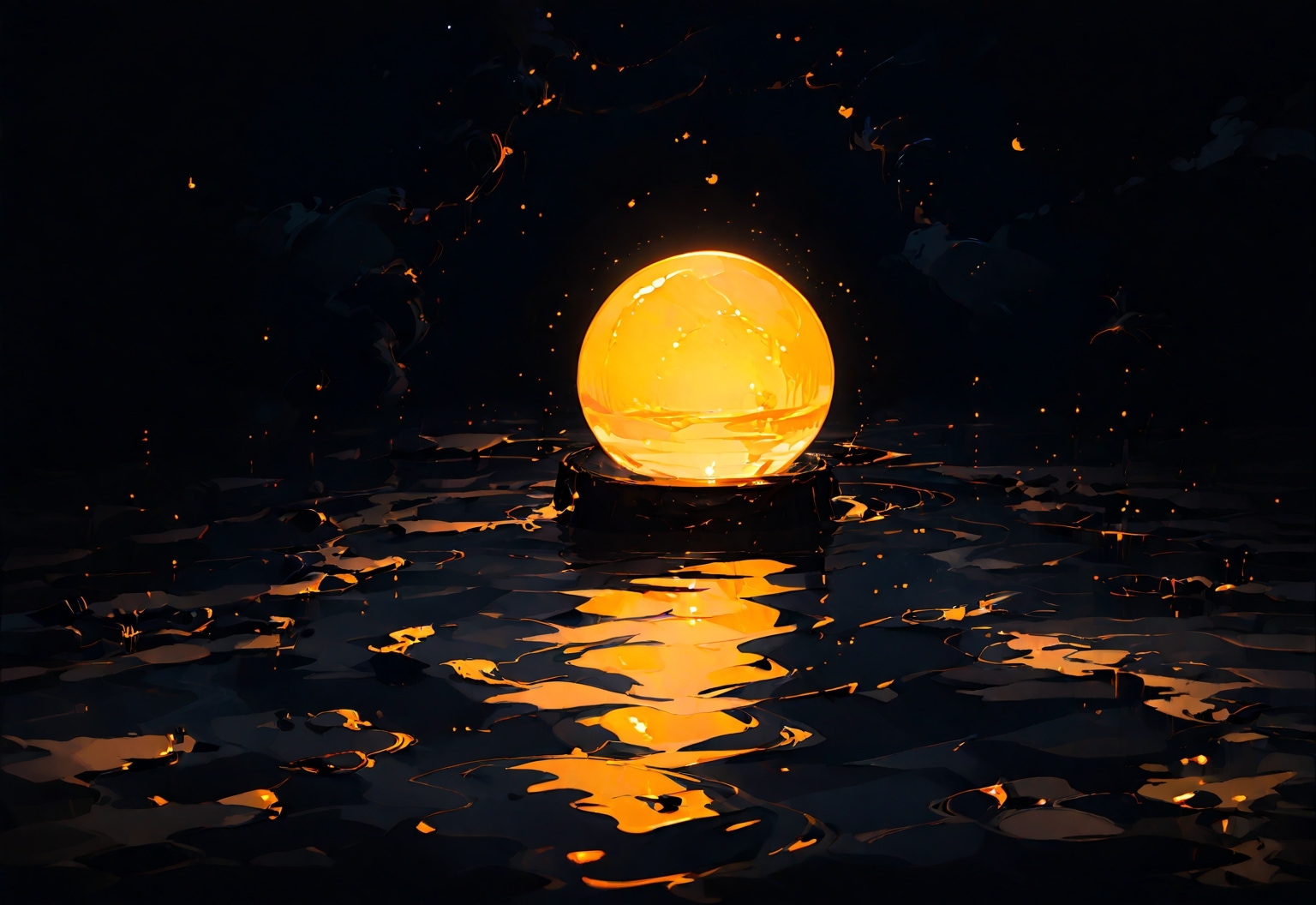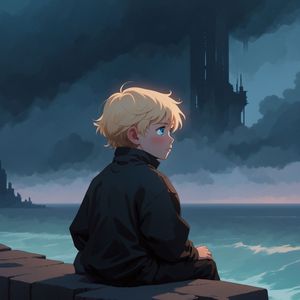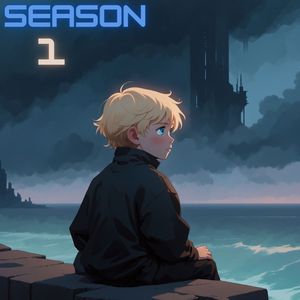Since the day I was torn from my mother’s womb, three years ago, I have been haunted by the memory of that failed attempt to end my existence. Often, I find myself wondering which path to take and what the future holds for someone like me.
I've never found the courage to repeat that act. Not out of consideration for those around me in this life — in the end, it doesn’t really matter. But death... it has always been with me, present in every breath, a constant shadow. Yet, the impulse to take the final step, the definitive act to end everything, always slips away. Perhaps, deep down, I fear the consequences. That irreversible decision, you know? It seems reckless, hasty. And so, I postpone. I procrastinate. I find excuses to bear the burden of continuing when I could simply... rest.
“Be wise.”
That’s what the entity told me. And, in a way, I have learned much over these countless lives. About nature and its intricate secrets, yes. But about the morality and ethics of sentient societies? Very little.
I carry vast knowledge of the mechanisms that govern the universe, but that’s not enough to be wise, is it? The answer, I imagine, you already know, entity.
It intrigues me how these creatures can feel something as deep as empathy — a concept that still escapes me. How is it possible to develop an emotional bond with someone other than myself? The ethics of these creatures seem... alien. They accept situations where they gain no advantage, and consider it a value. Having comrades is important to them. But, in past lives, I would have devoured them if the situation became complicated. Yes, there are symbiotic relationships, but those do not come before individual survival, right?
The existence of an afterlife, the presence of an entity powerful enough to revive souls, and the mechanics of reincarnation are questions that still evade me. Who was I at the beginning of it all? And what have I become? — Corrupted, just like my kind. — But who are they, anyway? Are there others like me? What are their natures, their strengths? And in what kind of universe do we dwell? Perhaps these answers are currently unreachable, like fragments of a larger mystery I’ve yet to be permitted to unravel. Even so, it is this search that, faintly, keeps me tied to this life. I will continue to believe in the lie that, at some point, everything will make sense. For now, I accept your guidance, incomprehensible and powerful entity.
My deep thoughts were interrupted by the vibrant sound of the Néfos children's laughter, a sentient species native to this world. They were engaged in a lively game of tag, although their small bodies barely reached a speed of 2 km/h. To them, this slow pace was the height of excitement, as if they were testing the limits of their abilities.
The little ones run joyfully through the alpine grass, their voices vibrating in the fresh air, indifferent to the weight of the darkness that permeates the adult world. For them, life is just a simple adventure, their innocent minds far from understanding the vastness of the chaos and malice lurking in the shadows. There’s something almost magical in the childlike view of reality; they are a reflection of a purity we, the older ones, lost along the way.
One of the children, her bluish tail wagging erratically, leapt toward another running ahead of her. But gravity — that invisible and inevitable force — reminded her of its presence. She stumbled, clumsily falling next to a wooden fence, the laughter of her companions echoing like a melody of innocence.
These fences, and much of the village’s constructions, were built with the wood of ancient trees that dominate the region. The trees are silent witnesses to the passage of time, their sturdy trunks providing material for the Néfos' homes, who prefer simplicity but do not forego beauty. The houses, rustic in architecture, are carved from dark wood, forming tribal circular arches adorned with furs and braided fabrics, fruits of local hunting and cultivation.
A single stone road, uneven and worn by centuries, cuts through the village. It stretches to the banks of a crystal-clear river that winds through the mountains. There, the Néfos fish and collect water, in a tradition passed down generation after generation, like a cycle of life that echoes the very order of nature.
In the center of the village, life pulses in the open square, which serves as the community's heart. The market is a vibrant spectacle, with colorful stalls decorating the space and offering everything from exotic fruits that seem to have absorbed sunlight to rustic tools skillfully carved by hand. The conversations among villagers mix with the sound of the breeze gently blowing through the trees.
Hanging between the high branches, lanterns made with electric bulbs flicker softly as night falls. Their glow competes with the stars in the sky, creating a light show that dances among the leaves, as if nature itself joined the celebration. The night here is never completely dark; there is always a spark of life, enhanced by the gaseous auroras, a sign that, despite everything, the absence of stars is not enough to mar the night.
Amid the village's simple, rustic buildings, there was a community school, a place where Nina, the eldest and wisest of the Néfos, shared the species' ancient wisdom. The wooden walls of the school are adorned with detailed paintings and primitive engravings that narrate the legends and history of the Néfos — a legacy that dates back centuries. The children, when not running freely through the grass or exploring the forest, gather there, seated in a semicircle around the elder, listening to her stories, which always aimed to teach something moralistic. That’s the problem: always trying to elevate the beauty of a world that is, by nature, unjust. Something I deeply hate, this utopian view that doesn’t align with the raw reality I know.
Next to the school, a small temple stands in respect to the Néfos' spirituality. With walls made of softly polished stones, the temple is a refuge of peace, a place where the villagers seek advice or indulge in meditation. Despite its simple appearance, there resides a faith that I consider hollow. The Néfos believe in harmony with nature, time, and space, revering false gods. A senseless idealism.
This bucolic environment contrasts sharply with the distant view: a colossal spiraling black tower tearing through the sky, so imposing that the clouds seemed to dissipate in its path. Unlike anything in that village, the tower possessed advanced technology, alien to the standards of this village, perhaps even to this world, embedded in its cold, dark metallic structure. Its black-silver glow emanates a sense of distant power, as if it belongs to a realm beyond the inhabitants' reach. I am fascinated by its presence. If it were another life, without these physical limitations, I would explore its secrets, unravel every mystery on my own. But I can’t. Not now, at least. I’m trapped in this limited body, surrounded by these sentient creatures, who barely comprehend what lies beyond their primitive needs.
Despite my disdain, there was some comfort in the simplicity of my routine. Not having to worry about food, simply waiting for my ‘mother’ to bring it at night. But lately, she has been leaving me here, in this village, all day, while she and my father go out exploring the world. They set off on their adventures, uncovering secrets I can’t even imagine, while I stay here, surrounded by children who avoid me. Sitting on the grass, leaning against a tree, all that’s left for me is to watch that black tower from afar. Monotonously.
“Kiel! Come! Elder Nina is going to tell a story! Come!” Nene’s sharp voice broke through my thoughts. She is a Néfo with bright red eyes, soft blue fur, and a long tail that twitches restlessly when she talks to me. Her excitement was almost palpable as she pointed to the largest building in the village, where the story would be told.
The Néfos have distinct markings on their bodies, and Nene’s were particularly interesting — patterns of dark lines that looked like circular scars, as if her very skin had been marked by an ancient ritual. She was different. The only child who wasn’t afraid of me. Unlike the others, who avoided me as if I were a threat, Nene always tried to include me in their games. It’s a shame I have no interest in them. Even so, sometimes, she won by sheer persistence.
"Come on! What are you waiting for? You need to learn, don’t you?" Nene insisted, walking toward me with relentless determination.
However, this time I decided to stand my ground. "Queru no," I replied, crossing my arms and closing my eyes in a display of childish disapproval, struggling to pronounce one of the few words I knew.
Nene wouldn’t accept refusal. "No? You don’t get to decide, Kiel Suiris!" she thundered, her small arms reaching out, ready to drag me by force if necessary.
How I hate being powerless!
Quickly, I grabbed the vine rope I had tied to the tree, the same one I was leaning against. In one swift motion, I looped it over my head, like an improvised seatbelt. “That won’t save you!” Nene shouted, as she tried to pull my legs, without success. Her face visibly sulked with each failed attempt.
“Now you’re in trouble!” I said, laughing maliciously. My victory, however, was short-lived. Nene quickly changed tactics, yanking the vine rope upward with force. I held on as tightly as I could, but it was clear that the battle was intensifying.
“You’re coming with me, whether you like it or not!” she cried, now visibly frustrated. Using all four limbs, she clung to the tree, pulling the rope with all her strength. I did my best to resist, throwing my full weight down, but I knew I couldn’t hold out much longer.
"Queru no! Queru no!" I shouted, my lower lip trembling as fake tears streamed down my face. Nene, however, was determined to win.
My arms began to weaken. The feeling of exhaustion took over, and I finally gave in. Nene managed to loosen the rope, leaving me completely exposed. I stumbled and fell awkwardly backward, sprawling on the ground.
With my back aching and a scrape on my elbow, I had no choice. I was defeated. With no alternatives, I surrendered.
…
I almost lost the entire afternoon listening to children's stories. The sky was already dark.
If anyone wonders why I always return to the same spot, under this tree, it’s because this is where I feel most comfortable. “The stories of an old decrepit woman don’t please me!” I mutter loud enough for myself.
“Who did you call an old decrepit woman?” echoed a familiar and irritated voice. “And where did you learn to say such nonsense? Must have been from your father, surely.”
What? I looked to the side and saw my ‘mother’ with her arms crossed, and next to her, elder Nina, leaning on her staff — the one I called the decrepit old woman.
IMPOSSIBLE! How did she hear me? I spoke so low!
She knelt and sat beside me...
"Son, you can’t talk about people like that. You need to respect your elders too; they have more wisdom than we do." She pulled me into a hug, though slightly irritated.
Who do you think is older here, Miss Ari? I am your baby of thousands of years!
“Hmm, young one, I’ll remember that,” muttered the old woman, her red eyes weary from time. Those that were once vivid were now faded, almost gray, showing how life slowly ebbs away.
As soon as Nina finished speaking, my ‘mother’ looked at me calmly, her sky-blue eyes glowing softly. She lowered her head and said, “Kiel, we mustn’t create enemies. Respecting others is important, even if we don’t like them. Don’t turn anyone into an enemy... Forgive my son’s disobedience.”
“Ari, where are you going? Aren’t you going to have dinner?” asked the elder, her voice filled with curiosity and slight concern as my mother carried me away from the village center.
“I’m going to be a mother,” she replied lightly, holding me in her arms, showing no evident emotion.
The elder lowered her head in a respectful gesture, making a slight bow before heading back to the building where everyone was. She slowly walked away, with hesitant steps, leaning on her staff in the grass with difficulty, every movement reflecting the weight of the age she carries.
…
As we passed through the door of the house, the silence between us was almost palpable. She guided me to the room and laid me on the bed, facing the balcony. Outside, the sky was a dark sea, starless, but tinged with swirling gases and auroras dancing in icy tones. The lights flickered softly, but the emptiness they filled felt suffocating.
She bent over the bag she brought, rummaging through its contents, while I remained still, watching the distant spectacle in the sky. The silence weighed heavily.
“Mom?” I murmured, without moving, my eyes still fixed on the colors outside.
“Wait a moment,” she said, without even lifting her head. Her hands moved with precision, almost mechanically, until they finally stopped. Carefully, she pulled out a book. Large, with a dark cover, it seemed to absorb the light of the auroras streaming through the window. The symbol on the cover was strange, almost hypnotic. Something about it bothered me, like a memory I couldn’t quite reach.
She gave no explanations. She simply placed the book on the table beside the bed, the sound of the cover hitting the wood echoing through the room. A sudden chill washed over me, but it wasn’t physical. It felt like the air around me was saturated with something I didn’t understand, something that slowly seeped into my mind.
Suddenly, a wave of pain surged through my body, but it wasn’t from the outside — it was from within, as if something was breaking through the barriers of my own consciousness. A flood of images and sensations overwhelmed my mind, too fast to comprehend, but powerful enough to leave me breathless.
My body trembled. My vision blurred. The world around me seemed to fragment, and I felt suspended between what was real and what should not exist. It was happening, my memories were bubbling up, trying to invade the consciousness of my new body.












Comments (0)
See all